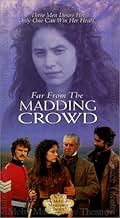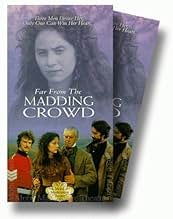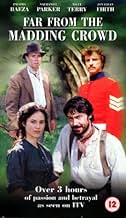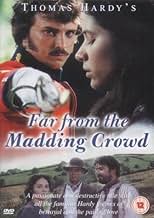Far from the Madding Crowd
- टीवी सीरीज़
- 1998
- 54 मि
IMDb रेटिंग
7.4/10
1 हज़ार
आपकी रेटिंग
अपनी भाषा में प्लॉट जोड़ेंA vain, pretty girl has recently taken over her uncle's farm. Her independent, naïve personality leaves her torn between the three men who wish to marry her.A vain, pretty girl has recently taken over her uncle's farm. Her independent, naïve personality leaves her torn between the three men who wish to marry her.A vain, pretty girl has recently taken over her uncle's farm. Her independent, naïve personality leaves her torn between the three men who wish to marry her.
- 1 BAFTA अवार्ड जीते गए
- 2 जीत और कुल 2 नामांकन
फ़ीचर्ड समीक्षाएं
I just finished writing my review for the 2015 version. I saw both versions within 2 weeks of each other for the first time and only 2 months after reading the book for the first time (absolutely loved it!!!).
Of the two movie versions I've seen, this is by far and away the more accurate of the two. Not surprising that Masterpiece Theater would trump Hollywood in that field, especially considering the runtime is twice as long. Granted that the 2015 version is much prettier to look at, I just think a digitally remastered Blu-ray release is what this version really needs. And new cover art! Rarely have I found such awful-looking cover art concealing such a good movie.
The actress for Bathsheba in this movie is way more age-appropriate (she's supposed to be about 18) for this part than Carey Mulligan (who just turned 30) in the new one. Her playfulness and flightiness make more sense at her young age. Paloma Baeza seems less confident as an actress than she is in "The Way We Live Now" (love her in that movie), but since the character Bathsheba is often conflicted about what she should do, it works for the role.
Oak and Troy were well-cast, I thought. The actor for Oak surprised me as a choice at first (I knew him best from the 1998 "Vanity Fair"), but then he seemed to fit quite well. And this Troy did a much better job than the one in the 2015 version, in my opinion.
I really did not like the actor for Boldwood at all at first (sorry, but he seems a bit creepy and his mouth always looks upside-down to me), but I'm watching this through a second time and he's bothering me much less than he did the first time, as I'm getting more used to him. He's still a bit too old for the part. Hardy describes him (I thought at the time I read it that it was a very clever description) thus: "Apparently he had some time ago reached that entrance to middle age at which a man's aspect naturally ceases to alter for the term of a dozen years or so.... Thirty-five and fifty were his limits of variation--he might have been either, or anywhere between the two." Nigel Terry was 53 at the time he made this, but easily looks 60 or older.
Just as a warning, there are a few brief scenes that are not appropriate for children. I tend to make the mistake sometimes in thinking that all PBS movies will be at PG standards (I wish they would), but that is not always the case. It is not extremely explicit (perhaps I will add a parental advisory note for this), but definitely gets to PG-13 content a few times.
Overall this is a very good and mostly faithful rendition of a great book. I'd venture to say that about 90% of this version is portrayed close (maybe shortened or adjusted for the screen, but generally true to the original characters' actions/intents) to what was in the book. And with almost 4 hours of viewing time, they are able to cover most of the story quite thoroughly, including spending some time showing the many minor characters as distinct individuals (which is something that the 2015 version has no time to do, to its loss, as much of the book is spent in the conversations of the farm hands).
I plan to watch this frequently, and if they do make a Blu-ray release, I plan to upgrade as soon as possible!
Of the two movie versions I've seen, this is by far and away the more accurate of the two. Not surprising that Masterpiece Theater would trump Hollywood in that field, especially considering the runtime is twice as long. Granted that the 2015 version is much prettier to look at, I just think a digitally remastered Blu-ray release is what this version really needs. And new cover art! Rarely have I found such awful-looking cover art concealing such a good movie.
The actress for Bathsheba in this movie is way more age-appropriate (she's supposed to be about 18) for this part than Carey Mulligan (who just turned 30) in the new one. Her playfulness and flightiness make more sense at her young age. Paloma Baeza seems less confident as an actress than she is in "The Way We Live Now" (love her in that movie), but since the character Bathsheba is often conflicted about what she should do, it works for the role.
Oak and Troy were well-cast, I thought. The actor for Oak surprised me as a choice at first (I knew him best from the 1998 "Vanity Fair"), but then he seemed to fit quite well. And this Troy did a much better job than the one in the 2015 version, in my opinion.
I really did not like the actor for Boldwood at all at first (sorry, but he seems a bit creepy and his mouth always looks upside-down to me), but I'm watching this through a second time and he's bothering me much less than he did the first time, as I'm getting more used to him. He's still a bit too old for the part. Hardy describes him (I thought at the time I read it that it was a very clever description) thus: "Apparently he had some time ago reached that entrance to middle age at which a man's aspect naturally ceases to alter for the term of a dozen years or so.... Thirty-five and fifty were his limits of variation--he might have been either, or anywhere between the two." Nigel Terry was 53 at the time he made this, but easily looks 60 or older.
Just as a warning, there are a few brief scenes that are not appropriate for children. I tend to make the mistake sometimes in thinking that all PBS movies will be at PG standards (I wish they would), but that is not always the case. It is not extremely explicit (perhaps I will add a parental advisory note for this), but definitely gets to PG-13 content a few times.
Overall this is a very good and mostly faithful rendition of a great book. I'd venture to say that about 90% of this version is portrayed close (maybe shortened or adjusted for the screen, but generally true to the original characters' actions/intents) to what was in the book. And with almost 4 hours of viewing time, they are able to cover most of the story quite thoroughly, including spending some time showing the many minor characters as distinct individuals (which is something that the 2015 version has no time to do, to its loss, as much of the book is spent in the conversations of the farm hands).
I plan to watch this frequently, and if they do make a Blu-ray release, I plan to upgrade as soon as possible!
I finally saw the 1967 version of Hardy's story, and while I thought it had excellent performances, the 1998 version is more satisfying. I've always liked both Alan Bates and Nathaniel Parker, but I think I'd have to give the latter the nod for his portrayal of the upright, conscientious Gabriel Oak. Nigel Terry is superb as the tragic Mr. Boldwood; his entire demeanor commanded more sympathy from me than did Peter Finch's portrayal -- you simply ache for the poor fellow when he's trying to gain even the slightest bit of encouragement from Paloma Baeza (who is exceptional as Bathsheba). I also thought this version was brighter and warmer than the visually gloomy, bleak 1967 version. (Well, perhaps that's really what Wessex looks like.) I realize this isn't exactly a happy tale, but it's nice to see SOME upbeat moments and sunshine once in awhile. All in all, a very satisfying performance -- a few hours well-spent.
10Jen-49
I didn't think it was possible. I'd always loved the 1967 Julie Christie version with Alan Bates as the upright shephard Gabriel Oak. But having seen this version, then reading the book (amazingly readable) and re-watching the 1967 version, I definitely give my vote to Nathaniel Parker as my favorite Gabriel. (OK, so he's even cuter than Alan Bates circa 1967, so that part's a no-brainer!)
Seriously, comparing the two versions and the book (which is more Gabriel Oak's story), it is obvious how the Alan Bates part in the 1967 version was butchered to create more screentime for Terrance Stamp and Peter Finch as well as Julie Christie. It also became apparent to me that Julie Christie was too old for the part. Paloma Baeza is much more realistic (and likeable) as the headstrong, impetuous Bathsheba. I also liked the fact that there seemed to be more passion seething just beneath Gabriel Oak's surface veneer than in the 1967 version. The final scenes where she accepts his proposal and post-wedding are a lot more passionate (still without a single kiss, alas!) than the cool (dispassionate) ending of the 1967 version.
Seriously, comparing the two versions and the book (which is more Gabriel Oak's story), it is obvious how the Alan Bates part in the 1967 version was butchered to create more screentime for Terrance Stamp and Peter Finch as well as Julie Christie. It also became apparent to me that Julie Christie was too old for the part. Paloma Baeza is much more realistic (and likeable) as the headstrong, impetuous Bathsheba. I also liked the fact that there seemed to be more passion seething just beneath Gabriel Oak's surface veneer than in the 1967 version. The final scenes where she accepts his proposal and post-wedding are a lot more passionate (still without a single kiss, alas!) than the cool (dispassionate) ending of the 1967 version.
I just happened to tune into this production on my local PBS station a few years ago and my immediate reaction was "Oh no, not another boring and stuffy Masterpiece Theatre production!" Well, fortunately I was totally unfamiliar with the plot of this film (which is based on the classic Hardy novel) and within minutes became completely riveted to my television when the character of Sergeant Troy appeared on the screen. Like Bathsheba, the female lead, I was completely taken in by Troy as portrayed by the actor Jonathan Firth and then horrified as to the events that followed. Again, this production caught me totally by surprise and it had some of the best acting scenes I have ever encountered .. a far cry from those period pieces where emotions are kept below the surface. That kind of acting is tiresome. The acting here is filled with alot of passion, emotion, and sparks. Best scene: Troy and Boldwood fighting over Bathsheba in the courtyard. It is shocking, despicable, heart-breaking, and sexy all at the same time! Compliments to all of the actors in a most underrated production.
I sometimes think that a film based on a Hardy novel should be shot at Stonehenge; the emotions brought out by his stories seem to be pre-Christian, the plot points seem to come from some dark corner of the human soul that Dickens and George Eliot never troubled to explore. I enjoyed this production while always remembering my dislike for Hardy's methods. Gabriel Oak is a wonderful creation and Nathaniel Parker is very effective in the part, I liked him more than Alan Bates, as good as Bates was.
Nigel Terry as Boldwood was the outstanding performance; his bull-like determination to have Bathsheba's hand, combined with his insecurities made a great impression. Jonathan Firth's part is a boy-toy basically; he doesn't have the substance to affect the viewer in any way. Paloma Baeza leaves an impression of not having thought out her character much, maybe she was a last-minute addition to the cast. She moves the story along well enough but the intellectual grasp of character is not there. It's the detail that makes the interest, the viewer keeps watching for the sheep-shearing and other aspects of rural life.
Nigel Terry as Boldwood was the outstanding performance; his bull-like determination to have Bathsheba's hand, combined with his insecurities made a great impression. Jonathan Firth's part is a boy-toy basically; he doesn't have the substance to affect the viewer in any way. Paloma Baeza leaves an impression of not having thought out her character much, maybe she was a last-minute addition to the cast. She moves the story along well enough but the intellectual grasp of character is not there. It's the detail that makes the interest, the viewer keeps watching for the sheep-shearing and other aspects of rural life.
क्या आपको पता है
- ट्रिवियाFeatured playing period music is the Mellstock Band, which also appeared in Tess of the D'Urbervilles (1998).
- कनेक्शनVersion of Far from the Madding Crowd (1909)
- साउंडट्रैकGee-Ho! Dobbin!
Performed by Paloma Baeza
टॉप पसंद
रेटिंग देने के लिए साइन-इन करें और वैयक्तिकृत सुझावों के लिए वॉचलिस्ट करें
विवरण
इस पेज में योगदान दें
किसी बदलाव का सुझाव दें या अनुपलब्ध कॉन्टेंट जोड़ें






























